List items
Items from the current list are shown below.
Blog
All items from May 2017
30 May 2017 : Catastrophic success #
I’ve been using computers in a serious way for the last 32 years and have been taking backup seriously for about half of that. Starting with backup to CD-WR in 2002, then to removable disk-caddy a few years later, and USB hard drive in 2007. For most of that time I’ve been aware of the importance of off-site backups, but it wasn’t until October last year that I actually started doing it. Now my machines all perform weekly incremental backups to my home server, which all then in turn gets client-side encrypted and transferred to Amazon S3.
Despite all of this effort I’ve never had to resort to restoring any of these backups. It’s surprising to think that over all this time, none of my hard drives have ever failed catastrophically.
That was until last Thursday, when I arrived home to discover Constantia, my home server, had suffered a serious failure due to a sequence of power cuts during the day. A bit of prodding made clear that it was the hard drive that had failed. I rely heavily on Constantia to manage my diary, cloud storage, git repos, DNS lookup and so on, so this was a pretty traumatic realisation. On Friday I ordered a replacement hard drive, which arrived Sunday morning.
Luckily Constantia has her operating system on a separate solid state drive, so with a bit of fiddly with fstab I was able to get her to boot again, allowing me to install and format the new drive. I then started the process of restoring the backup from S3.
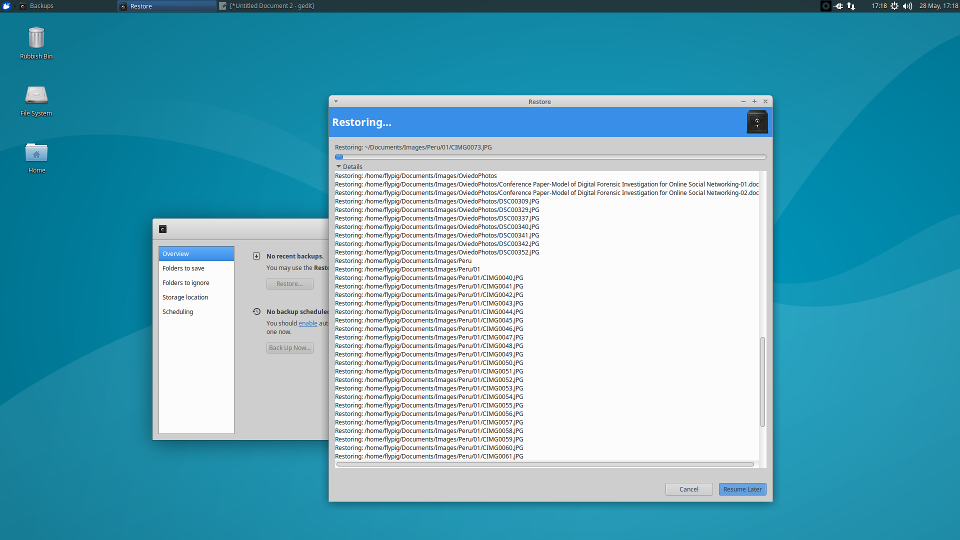
Thirteen hours and 55 minutes later, the restore is complete. Astonishingly, Constantia is now as she was before the backup. Best practice is to test not just your backup process regularly, but your restore process as well. But it’s a time consuming and potentially dangerous process in itself, so I’m not proud to admit that this was the first time I’d attempted restore. I’m therefore happy and astonished to say that it worked flawlessly. It’s as if I turned Constantia off and then three days later turned her back on again.
Credit goes to the duplicity and déjà-dup authors. Your hard work made my life so much easier. What could have been hugely traumatic turned out to be just some lost time. On the other hand, it also puts into perspective other events that have been happening this weekend. BA also suffered a power surge which took out its systems on Saturday morning. It took them two days to get their 500 machines spread across two data centres back up and running, while it took me three days to get my one server restored.
Comment
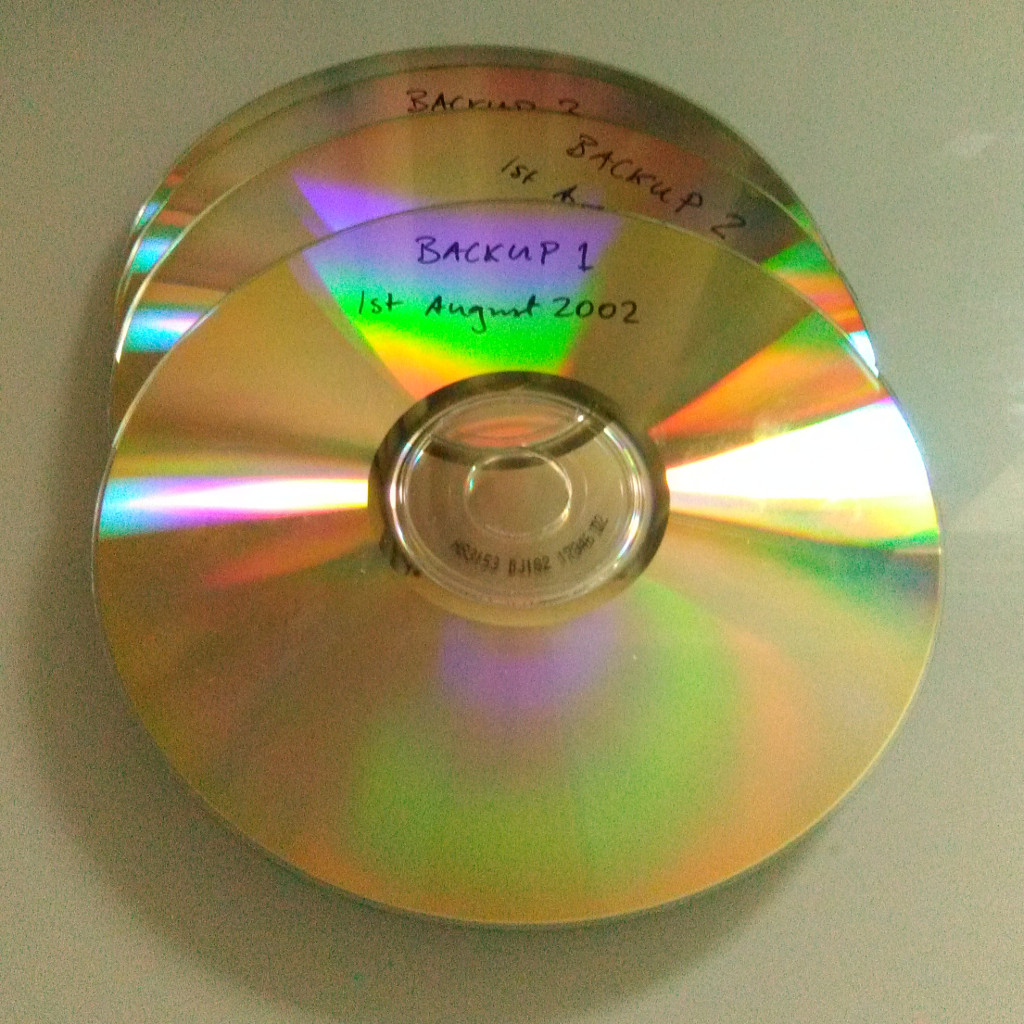 |
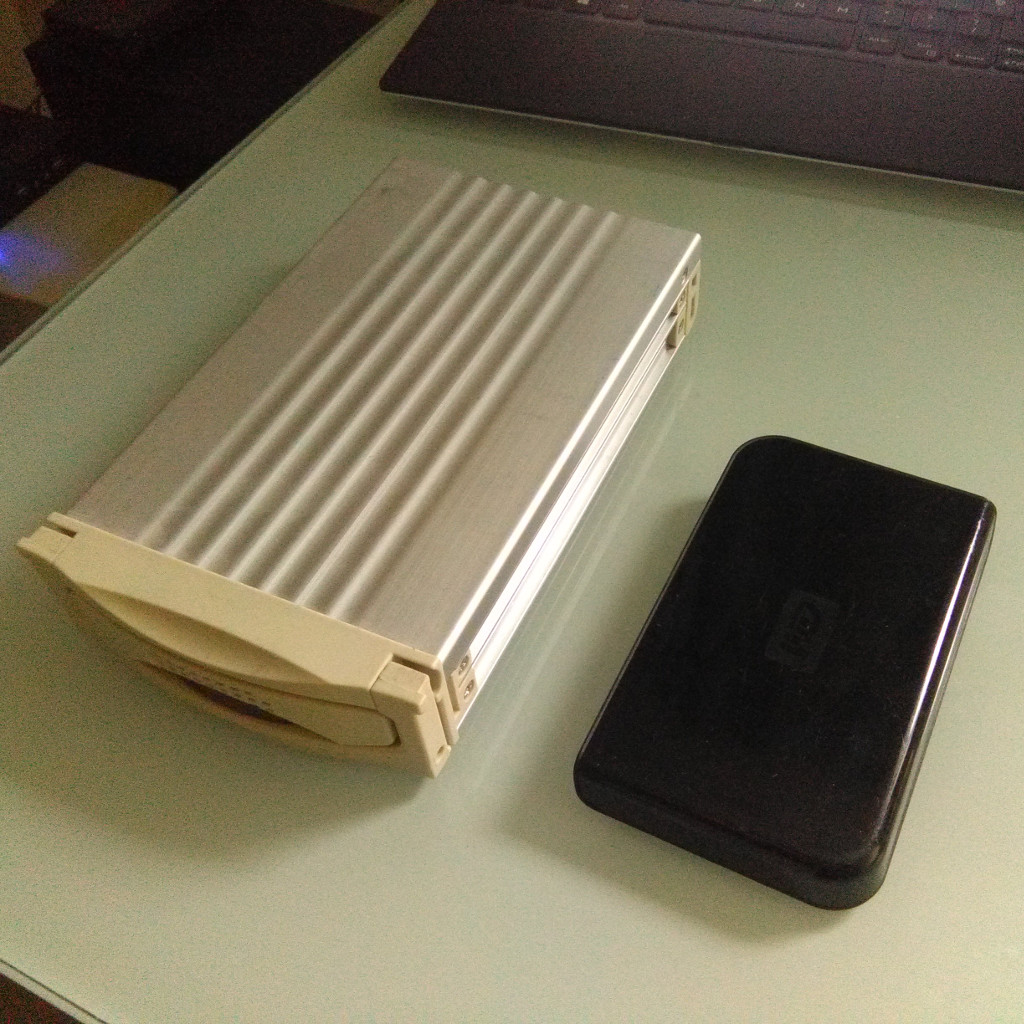 |
| CD backup in 2002 | Hard drive backup in 2007 |
Despite all of this effort I’ve never had to resort to restoring any of these backups. It’s surprising to think that over all this time, none of my hard drives have ever failed catastrophically.
That was until last Thursday, when I arrived home to discover Constantia, my home server, had suffered a serious failure due to a sequence of power cuts during the day. A bit of prodding made clear that it was the hard drive that had failed. I rely heavily on Constantia to manage my diary, cloud storage, git repos, DNS lookup and so on, so this was a pretty traumatic realisation. On Friday I ordered a replacement hard drive, which arrived Sunday morning.
Luckily Constantia has her operating system on a separate solid state drive, so with a bit of fiddly with fstab I was able to get her to boot again, allowing me to install and format the new drive. I then started the process of restoring the backup from S3.

Thirteen hours and 55 minutes later, the restore is complete. Astonishingly, Constantia is now as she was before the backup. Best practice is to test not just your backup process regularly, but your restore process as well. But it’s a time consuming and potentially dangerous process in itself, so I’m not proud to admit that this was the first time I’d attempted restore. I’m therefore happy and astonished to say that it worked flawlessly. It’s as if I turned Constantia off and then three days later turned her back on again.
Credit goes to the duplicity and déjà-dup authors. Your hard work made my life so much easier. What could have been hugely traumatic turned out to be just some lost time. On the other hand, it also puts into perspective other events that have been happening this weekend. BA also suffered a power surge which took out its systems on Saturday morning. It took them two days to get their 500 machines spread across two data centres back up and running, while it took me three days to get my one server restored.
28 May 2017 : Catastrophic failure #
A series of power cuts last Thursday left Constantia, my home server in a sorry state. On start-up, she would make a sort-of repeating four-note melody, then crash out to a recovery terminal.
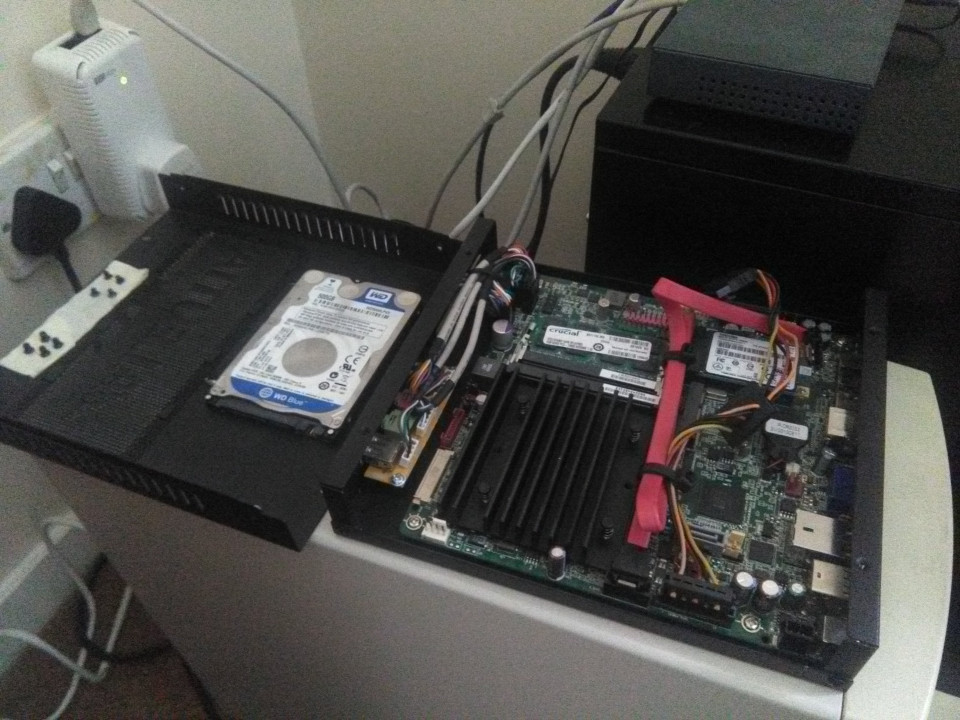
I've subsequently discovered that the strange noises were from the hard drive failing, presumably killed by the repeated power outages. A replacement hard drive arrived this morning (impressively on a Sunday, having been ordered from Amazon Friday evening), which I'm in the process of restoring a backup onto.
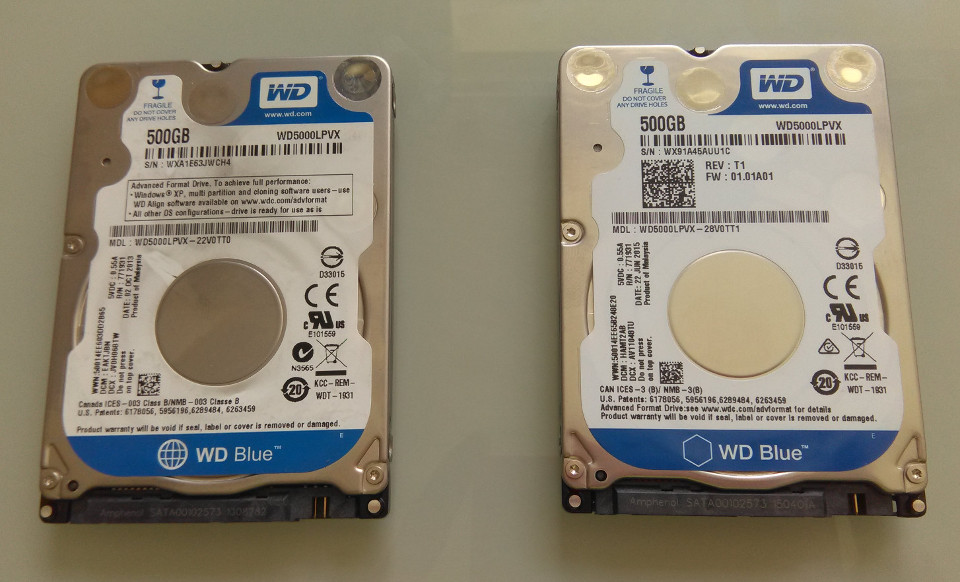
Right now I'm apprehensive to say the least. This is the first real test of my backup process, which stores encrypted snapshots on Amazon S3 using Déjà Dup. If it works, I'll be happy and impressed, but I'm preparing myself for trouble.
When I made the very first non-incremental backup of Constantia to S3 it took four days. I'm hoping restoring will be faster.
Comment

I've subsequently discovered that the strange noises were from the hard drive failing, presumably killed by the repeated power outages. A replacement hard drive arrived this morning (impressively on a Sunday, having been ordered from Amazon Friday evening), which I'm in the process of restoring a backup onto.

Right now I'm apprehensive to say the least. This is the first real test of my backup process, which stores encrypted snapshots on Amazon S3 using Déjà Dup. If it works, I'll be happy and impressed, but I'm preparing myself for trouble.
When I made the very first non-incremental backup of Constantia to S3 it took four days. I'm hoping restoring will be faster.
6 May 2017 : Detectorists #
Last week while away in Paris at EuroUSEC I received a distraught phone call from Joanna. She'd been mowing the lawn (reason enough for distress in itself) and in the process lost her engagement ring. She was pretty upset to be honest, which made me upset being so far away and not able to help. The blame, it transpired, could be traced back to the stinging nettles in our garden. Joanna had been stung while clearing them and moved the ring onto her right hand as a result. That left it more loose than usual, and it probably then fell off while bailing grass cuttings.
We determined to search and find the ring when I got back, and as a backup plan we'd source a metal detector and try that if it came to it. Having seen every episode of Detectorists and loved them, we knew this would work. Secretly, neither of us were quite so certain.
Our unaided search proved fruitless. We scoured the garden over the whole weekend, but ultimately decided our rudimentary human senses weren't going to cut it. We ordered a £30 metal detector from Amazon. In case you're not familiar with the metal-detector landscape, that really is at the bottom end of the market. We weren't really prepared to pay more for something we anticipated using only once, and that might anyway turn out to be pointless. As you can see, we really didn't fancy our chances.
We used the metal detector for a bit, but again, didn't seem to be getting anywhere. It would happily detect my silver wedding ring, and buzzed aggressively when I swooshed it too close to my shoes (metal toe caps; they confuse airport security no end as well), but finding anything other than my feet was proving to be a lot harder.
We discovered that the detector doesn't just detect metal in the general, but can differentiate between different types of metal depending on how it's configured. Joanna's ring is white gold, not silver, so we had to find another piece of white gold in the house to test it on.
Soon after that we started to uncover treasure. First a scrunched up piece of aluminium foil buried a few centimetres under our lawn. Then a rusty corner of a piece of old iron sheeting about 5mm think, buried some 10cm below the ground. As you can imagine we were feeling a lot more confident after having found some real treasure.
And then, just a few minutes later, the detector buzzed again and scrabbling through the grass cuttings revealed Joanna's lost engagement ring, lost no more.
We were pretty chuffed with ourselves. And we were pretty chuffed with the metal detector. If the Detectorists taught us anything, it's that finding treasure is hard. Granted our treasure-hunting creds are somewhat undermined by us having lost the treasure in the first place, but we found the treasure nonetheless. And it was gold we found, so justification enough for us to perform a small version of the gold dance.
Comment
We determined to search and find the ring when I got back, and as a backup plan we'd source a metal detector and try that if it came to it. Having seen every episode of Detectorists and loved them, we knew this would work. Secretly, neither of us were quite so certain.
Our unaided search proved fruitless. We scoured the garden over the whole weekend, but ultimately decided our rudimentary human senses weren't going to cut it. We ordered a £30 metal detector from Amazon. In case you're not familiar with the metal-detector landscape, that really is at the bottom end of the market. We weren't really prepared to pay more for something we anticipated using only once, and that might anyway turn out to be pointless. As you can see, we really didn't fancy our chances.
We used the metal detector for a bit, but again, didn't seem to be getting anywhere. It would happily detect my silver wedding ring, and buzzed aggressively when I swooshed it too close to my shoes (metal toe caps; they confuse airport security no end as well), but finding anything other than my feet was proving to be a lot harder.
We discovered that the detector doesn't just detect metal in the general, but can differentiate between different types of metal depending on how it's configured. Joanna's ring is white gold, not silver, so we had to find another piece of white gold in the house to test it on.
Soon after that we started to uncover treasure. First a scrunched up piece of aluminium foil buried a few centimetres under our lawn. Then a rusty corner of a piece of old iron sheeting about 5mm think, buried some 10cm below the ground. As you can imagine we were feeling a lot more confident after having found some real treasure.
And then, just a few minutes later, the detector buzzed again and scrabbling through the grass cuttings revealed Joanna's lost engagement ring, lost no more.
We were pretty chuffed with ourselves. And we were pretty chuffed with the metal detector. If the Detectorists taught us anything, it's that finding treasure is hard. Granted our treasure-hunting creds are somewhat undermined by us having lost the treasure in the first place, but we found the treasure nonetheless. And it was gold we found, so justification enough for us to perform a small version of the gold dance.
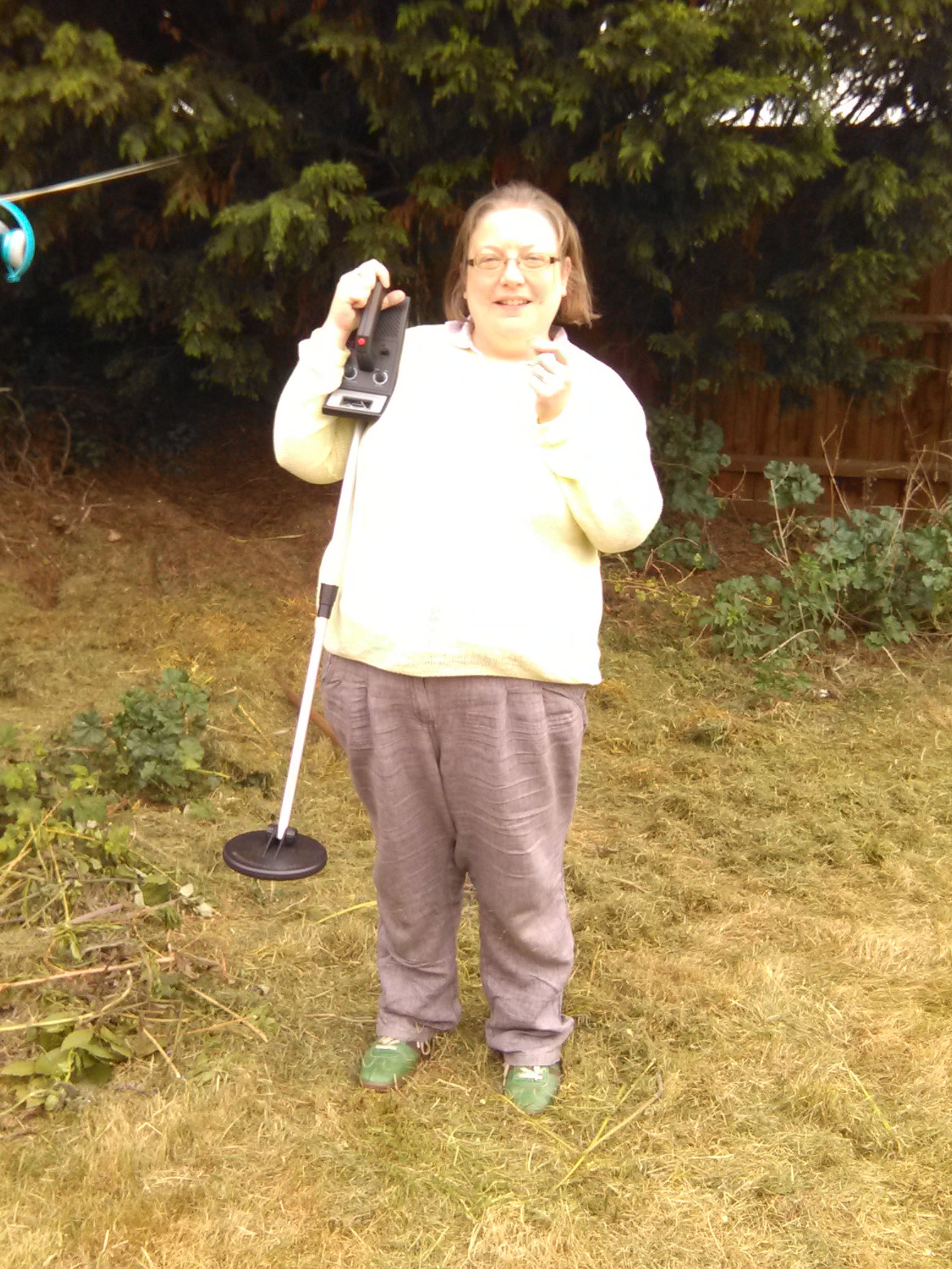
|
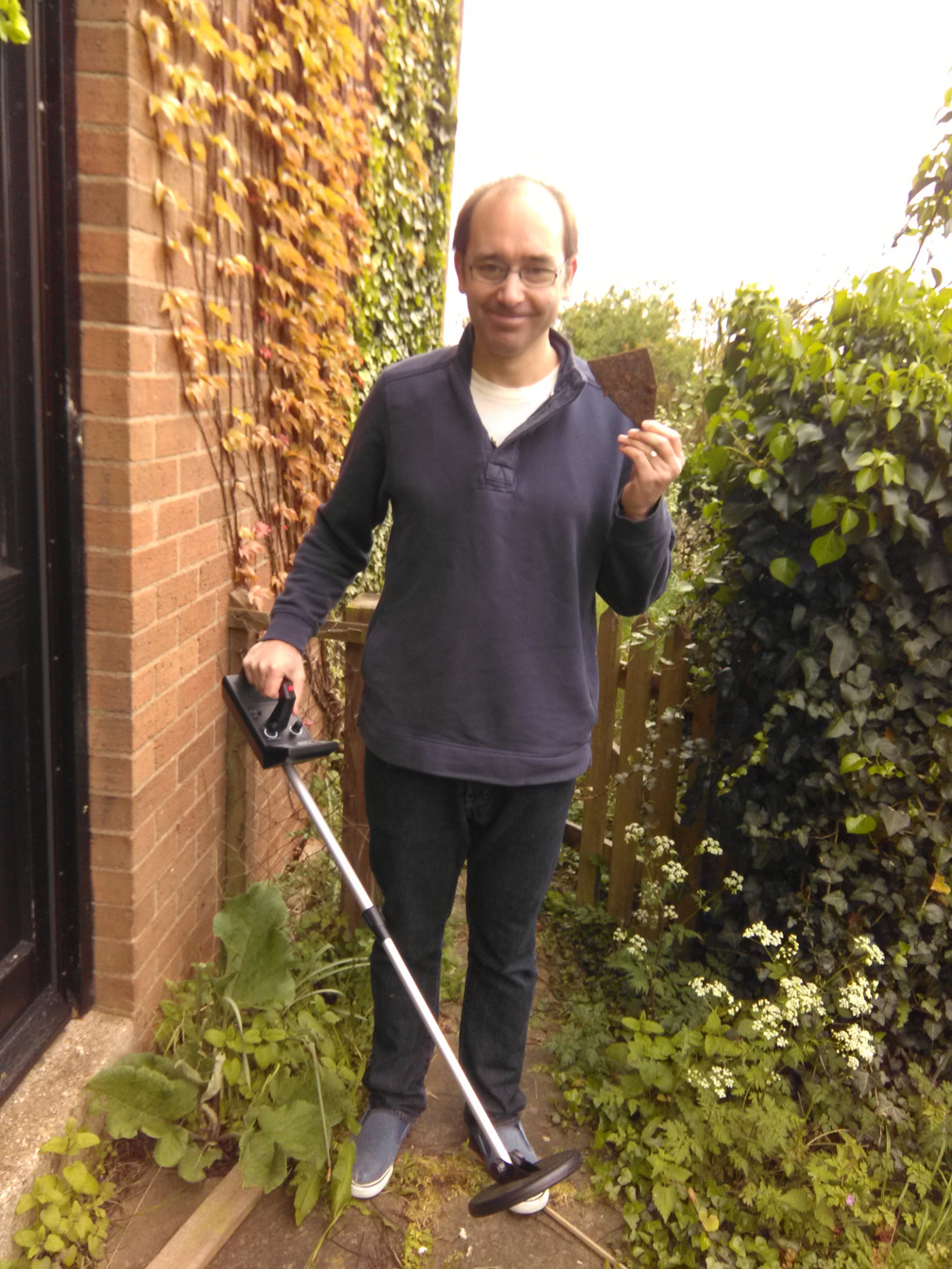
|
| Joanna found a white-gold ring... | ...while I found a rusty old sheet of iron |